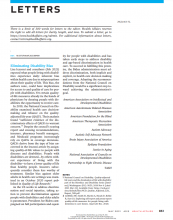The following Letter to the Editor was published in the May 2021 issue of Health Affairs.
Lisa Iezzoni and coauthors (Feb 2021) exposed what people living with disabilities experience daily: inherent bias within health care due to misperceptions about their quality of life. This bias, the authors note, could have implications for access to and quality of care for people with disabilities. Yet certain quality-of-life measures already tie the hands of physicians by denying people with disabilities the opportunity to receive care.
In 2019, the National Council on Disability examined health care decisionmaking and reliance on the quality-adjusted life-year (QALY). Their analysis found “sufficient evidence of the discriminatory effects of QALYs to warrant concern.”1 Despite the council’s searing report and ensuing recommendations, insurers, pharmacy benefit managers, and Medicaid programs increasingly rely on QALYs in coverage decisions. QALYs derive from the type of bias uncovered in the Iezzoni article by assigning quality-of-life values to people with diseases and disabilities. People with disabilities are deemed—by others without experience of living with the disability—to have a lower quality of life than healthy people. Insurers subsequently consider them less worthy of treatment. Similar bias against older adults in health care settings was examined in an October 2020 report published in Quality of Life Research.2
As the US works to address discrimination and social injustice, taking action to prevent discrimination against people with disabilities and older adults is paramount. President Joe Biden campaigned on full participation and equality for people with disabilities and has taken early steps to address disability and age-based discrimination in health care. To succeed in fulfilling this promise, the Biden administration must address discrimination, both implicit and explicit, in health care decision making and coverage. Adopting the recommendations from the National Council on Disability would be a significant step toward achieving the administration’s goal.
American Association on Intellectual and Developmental Disabilities
American Autoimmune Related Diseases Association
American Foundation for the Blind
American Therapeutic Recreation Association
Autism Advocacy
Autistic Self Advocacy Network
Brain Injury Association of America
Epilepsy Foundation
Justice in Aging
National Association of Councils on Developmental Disabilities
Partnership to Fight Chronic Disease
TASH
NOTES
1 National Council on Disability. Quality-adjusted life years and the devaluation of life with disability: part of the Bioethics and Disability Series [Internet]. Washington (DC): NCD; 2019 Nov 6 [cited 2021 Mar 24]. Available from: https://ncd.gov/sites/default/files/NCD_Quality_Adjusted_Life_Report_508.pdf
2 Griffiths AW, Smith SJ, Martin A, Meads D, Kelley R, Surr CA. Exploring self-report and proxy-report quality-of-life measures for people living with dementia in care homes. Qual Life Res. 2020;29(2):463–72.
https://www.healthaffairs.org/doi/10.1377/hlthaff.2021.00409


